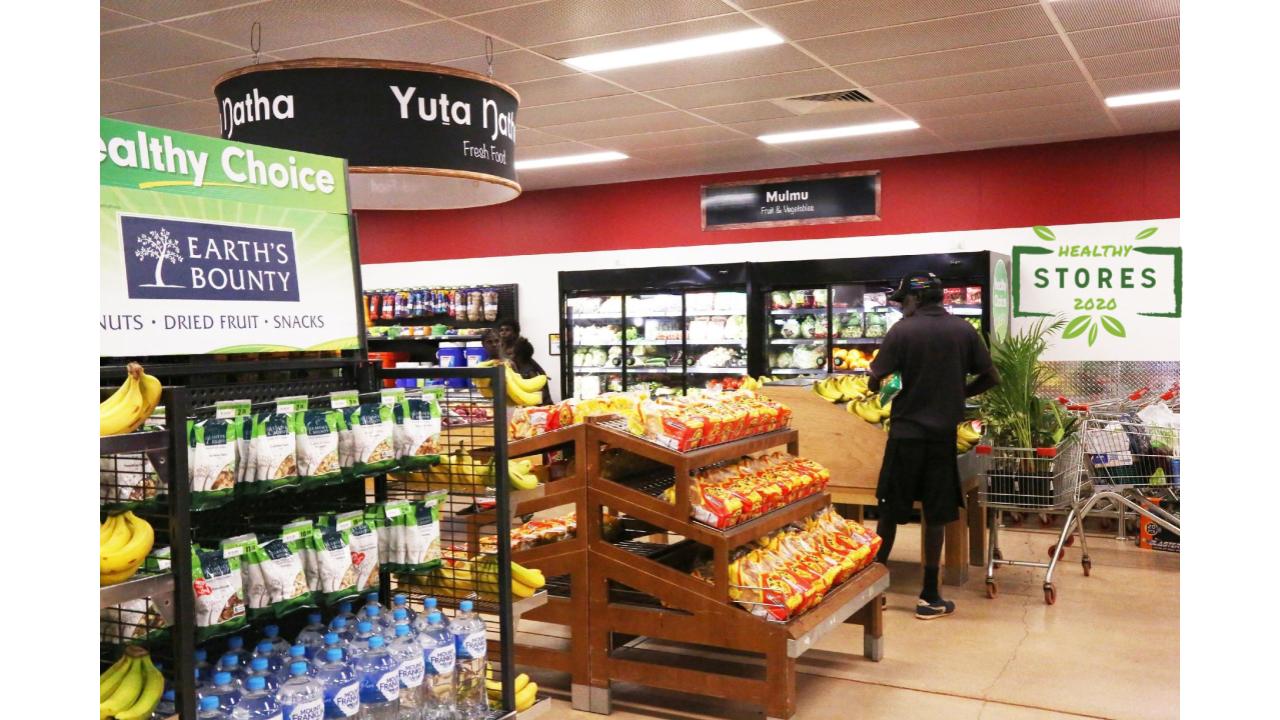Media release
From: Monash UniversityThursday October 8th, 2020
EMPOWERING REMOTE COMMUNITIES - HEALTHY STORES 2020
Reducing in-store merchandising of unhealthy foods and drinks can reduce the purchase of those items, new research conducted in indigenous communities has found.
Healthy Stores 2020, established by Monash University in partnership with The Arnhem Land Progress Aboriginal Corporation (ALPA), was implemented across 14 NT and six QLD remote community stores. The focus was on reducing the merchandising of unhealthy products, and specifically sugar, sugar-sweetened beverages, sweet biscuits and confectionery, while increasing the merchandising of healthier options.
The findings of the study have now been published in the Lancet Planetary Health.
They show the initiative resulted in a 6.8 per cent reduction in free sugars purchased from sugar sweetened beverages, a 7.5 per cent reduction in free sugars purchased from confectionery, 10.1 per cent increase in weight sold of healthier drinks, and a 21.5 per cent reduction in free sugars from sugar sweetened soft drinks in six stores where large unit soft drinks were removed from refrigeration.
The 12 week trial resulted in the equivalent of 1.8 tonnes less of sugar sold from the 10 stores that received the strategy - equal to the weight of a large car. Importantly, no adverse impact was shown for business outcomes.
Excessive intake of unhealthy food and drinks, such as soft-drink and confectionery, is a major contributor to preventable diet-related disease for all Australians.
For the Aboriginal and Torres Strait Islander population living in remote communities, unhealthy products provide 42 per cent of total energy intake and account for 53 per cent of food and beverage expenditure.
Keith Lapulung Dhamarrandji, The Arnhem Land Progress Aboriginal Corporation (ALPA) Board Director, said that as a community they were “worried about the health of our children, especially a lot of sugary stuff; drinks like fizzy drinks”.
“The dhudi dhawu (bottom line) is that it's not about stopping people, they still have the choice. ALPA wants them to make good decisions,” he said.
Associate Professor Julie Brimblecombe from Monash University explained Healthy Stores 2020 was implemented “in response to community leaders who expressed concern about the many different sugary products now available in stores and the high amount of sugar consumed”.
“Healthy Stores 2020 shows that retail food environments can be reshaped in partnership with retailers to assist families in choosing healthier options,” she said.
ALPA nutritionist Khia De Silva said they sought collaboration and input from community leaders, researchers and retailers, to create an acceptable in-store strategy.
“Initially our team was worried about negative customer reactions. We were all blown away by the responses, ranging from overwhelming support to not even noticing. This response gave store boards confidence to implement Healthy Stores 2020 ongoing, and to trial further sugar reduction strategies.”
Healthy Stores 2020 has demonstrated, through a randomised controlled trial, that the amount of free sugars purchased in remote communities can be reduced significantly through a low cost intervention while still offering choice.
ALPA believed the results to be of such importance to the communities it serves that it met with directors of the stores it manages and with their support converted all stores to Healthy Stores 2020.
Joan Djamalaka, Director ALPA board, said: “I am really proud to present this strategy to other stores. It is a good strategy that can help lots of different people. We are leading the way at ALPA telling the world our story.”
“All stores including city stores like Woolworths and Coles need to be more transparent, they are also affecting the health of indigenous people.”
Healthy Stores 2020 was established by Monash University in partnership with The Arnhem Land Progress Aboriginal Corporation (ALPA), and in conjunction with the Menzies School of Health Research, The University of Queensland, University of South Australia, Dalhousie University (Canada), Institute of Health Transformation Deakin University and University of Waterloo (Canada). The research was conducted independently to ALPA's commercial partners.
Read the full paper in Lancet Planetary Health title: Restricted Retail Merchandising of Discretionary Food and Beverages for Improved Population Diet: A Pragmatic Randomized Controlled Trial
DOI: 10.1016/S2542-5196(20)30202-3
Read more about the study in Monash Lens.
Click here for more information on Healthy Stores 2020
Media Assets Available:
Healthy Stores 2020 Short Film (6:00min)
Comments from:
Associate Professor Julie Brimblecombe - Monash University
Joseph Gideon Pangiraminni - Pirlangimpi Indigenous Corporation
Florence Marraykama - ALPA Store
Khia De Silva - ALPA Nutritionist
Anthony Gunther - Menzies School of Health Research
Mark Peters - ALPA Store
Keith Lapulung Dhamarrandiji - ALPA BoardHealthy Stores 2020 Video 1 Research Issue (1.05min)
Healthy Stores 2020 Video 2 Research Approach (1.09min)
Healthy Stores 2020 Video 3 Research Details (1.11min)
Healthy Stores 2020 Video 4 Community Support (1.07min)
Healthy Stores 2020 Video 5 Research Collaboration (1.06min)
Infographic
Healthy Stores Brochure
Images
Monash Lens feature story for republication
Also available upon request:
Video with Khia De Silva - ALPA Nutritionist


